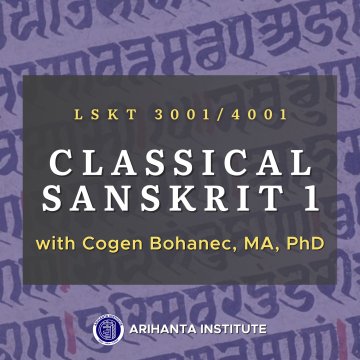Sanskrit 1
Course Intro Video


Sanskrit 1
 Fall 2025 (September 2 – December 8, 2025)
Fall 2025 (September 2 – December 8, 2025)Monday 8:00 - 9:25 a.m. / Friday 8:00 - 9:25 a.m. PT
Course LSKT 8001/9001 is a course in the MA in Engaged Jain Studies program offered by Claremont School of Theology (CST).
Sanskrit 1 will complete the first half of the Devavāṇīpraveśikā Sanskrit primer (Goldman and Goldman, 1980). In the process, students will learn to memorize, recognize, and recall all major paradigms of inflection (conjugations, declensions, indeclinable suffixes, prefixes, etc.). Students will gain the important research skills of basic philology such as etymology and syntactical analyses while translating modified excerpts from Sanskrit literature. Students will also memorize important Sanskrit verses designed to enhance basic vocabulary and impart familiarity with the cultural, philosophical, and linguistic landscape of Sanskrit literature.
Learning Objectives
- Learn to read Sanskrit in Devanagari font.
- Acquire basic Sanskrit vocabulary.
- Learn to identify and understand the basic grammatical forms covered in class.
- Learn to understand key differences between Sanskrit and English syntaxes and to be able to convert Sanskrit syntax into English syntax.
- Learn basic skills for translation of Sanskrit primary sources for research
- Become familiarized with other cultural and intellectual elements of the broader Sanskrit tradition.
Student Reviews
- “I just completed a year of Sanskrit under Dr. Bohanec, who has devised an accessible approach to the language even the densest aspiring linguist (me) can utilize. He also, almost reflexively, situates the language in its broader dharmic settings, giving students a historical, cultural, and theological education in addition to the Sanskrit itself. Finally, he's just a righteous dude. I highly, highly recommend this [course].”— Reese L., Graduate Student, Claremont School of Theology, 2024
- “Prof. Bohanec is an immense mind and I feel privileged to have had a course with him...[his] encouragement, kindness, sense of humor, and vast body of knowledge in South Asian studies, ethics, and exegesis are incredible. I also appreciated how encouraging he was at every stage...This is the most difficult course I've taken and Prof. Bohanec is to be commended for "data compressing" such difficult material, and providing such a positive and constructive environment.— Graduate Student, Claremont School of Theology, 2024
- There were so many helpful things about this course! In-class translation work with other students was wonderful. The best advice given by the instructor was to do what it took to enjoy the material itself. This “enjoyment” emphasis was often in direct conflict with class expectations (see next answer), but over the break I continue to study and emphasize finding enjoyment in those studies. This has ended up changing my entire outlook on the MA program in general, and Prof. Bohanec cannot be over-thanked for this suggestion; simple as it is, it has been very impactful.”— Graduate Student, Claremont School of Theology, 2024
Course Details
To enroll in this course, please email: study@arihantainstitute.org.Instructor
 Cogen Bohanec, MA, PhD
Cogen Bohanec, MA, PhD
Cogen Bohanec currently holds the position of Assistant Professor in Sanskrit and Jain Studies at Arihanta Institute where he teaches various courses on Jain philosophy and its applications. In addition, he is an Adjunct Assistant Professor at Claremont School of Theology (CST) where he teaches Sanskrit and Gujarati, and he has taught numerous classes on South Asian Culture & Religions and Sanskrit language at the Graduate Theological Union (GTU) in Berkeley. Dr. Bohanec specializes in the Jain and Hindu traditions, comparative dharma traditions, philosophy of religion, theo-ethics (virtue ethics, and environmental and animal ethics in particular), and Sanskrit language and literature, and has numerous publications in those areas, particularly in the fields of Jain and Hindu Studies amongst other disciplines. He has a PhD in “Historical and Cultural Studies of Religion” with an emphasis in Hindu Studies from GTU, where his research emphasized ancient Indian languages, literature, and philosophical systems. He also holds an MA in Buddhist Studies from the Institute of Buddhist Studies at GTU where his research primarily involved translations of Pāli Buddhist scriptures in conversation with the philology of the Hindu Upaniṣads. He is the author of “Bhakti Ethics, Emotions and Love in Gauḍīya Vaiṣṇava Metaethics” (Lexington, 2024), an interdisciplinary study that frames traditional Hindu themes of ecotheology, ecofeminist theology, feminist care ethics, within a framework of virtue ethics in conversation with a bhakti-based psychology of emotions. Currently he is largely engaged in publication and research on various aspects of the Jain tradition, emphasizing translations and analyses of Jain Sanskrit, Prakrit, and Gujarati texts, but is also publishing academic works on various topics within the Hindu tradition.
Enrollment Options
14-DAY FREE TRIAL
- Free, unlimited access to our self-paced courses for 14-days.
- Already used your free trial? Enroll in our Monthly or Annual Membership options at anytime and continue learning immediately!
MONTHLY MEMBERSHIP
- $45 USD / Month
-
Immediate access to course
#### | Name. - Unlimited access to our live and self-paced courses for one month, with month-to-month auto rollover.
- Excludes graduate seminars, language courses, and courses hosted on partner platforms.

